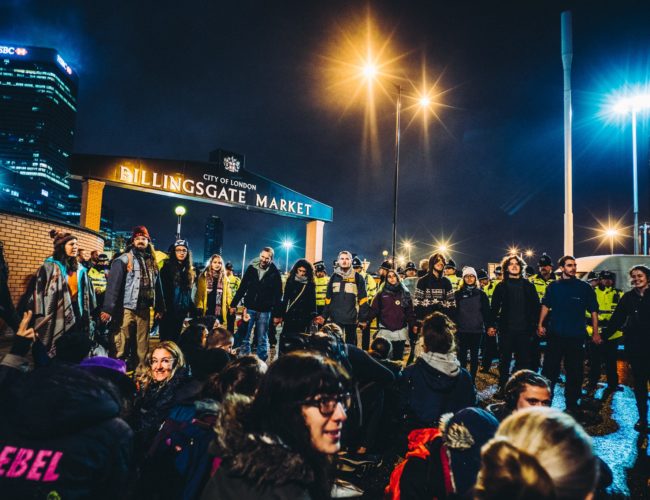Amidst the wave of protests shaping the globe in 2019, Animal Think Tank and the activists behind Animal Rebellion have had an extraordinary year. Repeatedly thrust into the mainstream through a range of high profile actions, they’ve occupied the UK’s largest meat market, and scored a prime time TV show-down between Piers – ‘Peas’ – Morgan and a floret-haired activist called Mr Broccoli.
 But behind the plant-based puns is an organisation who are deadly serious about building a sustainable movement fighting for justice for all animals. We spoke with Laila Kassam, co-founder of Animal Think Tank, and participant at several Ulex courses, to ask her to shed some light on some of the tactics used by Animal Rebellion and the concepts and principles which have underpinned the organizational strategy in their inaugural year, along with her areas of concern about Extinction Rebellion.
But behind the plant-based puns is an organisation who are deadly serious about building a sustainable movement fighting for justice for all animals. We spoke with Laila Kassam, co-founder of Animal Think Tank, and participant at several Ulex courses, to ask her to shed some light on some of the tactics used by Animal Rebellion and the concepts and principles which have underpinned the organizational strategy in their inaugural year, along with her areas of concern about Extinction Rebellion.
Interview by Lindsay Alderton
Hey Laila, it’s sure been a ‘fruitful’ year for the folks at Animal Think Tank. Can you tell us a little bit more about the organization and how you got involved?
Lols. Be careful getting started with those plant-based puns, they can be addictive!
Animal Think Tank is a volunteer-based grassroots collective based in Lancaster, UK, that currently consists of myself, Mark Westcombe and Dan Kidby. We officially launched in November of last year but the idea came about a few years earlier when Mark was reading a book about the slavery abolition movement and had a big realisation that we needed to do this for other animals. Following on from this he tried to find a movement, or people who were doing this sort of thing already, and couldn’t. And then he came across Dan and then Dan came across me, and we all shared similar ideas, and so the group and the mission started to catalyse.
What we are really hoping to do is to build a broad-based, powerful, anti-speciesist mass movement for animal justice in the UK. We want to ensure that all individual animals have their rights to life, liberty and security of person protected in law and respected by society.
Our aspirations as Animal Think Tank are different from our involvement with Animal Rebellion which we helped to start. Animal Rebellion sits separately as a group within the XR Rebel Alliance. Our main message as Animal Think Tank is an anti-speciest message, whereas Animal Rebellion is more linked with the climate and environmental angle. From an Animal Think Tank perspective, our aspiration is to abolish the trade and killing of other animals for food and all the other uses, ideally through an eventual piece of legislation.

Why is this work important at this time?
Over 70 billion land animals are killed globally for food every year, and between 1 and 3 trillion sea animals. The scale of that suffering is incomprehensibly horrendous. We’re at a point now where mainstream views are shifting and there’s a lot of opportunity with the significant shift around veganism, and then the whole conversation opening up around the climate and ecological emergency, and animal agriculture playing such a significant part in that problem. This means there’s a lot of potential and openings happening at the moment that make something like the work that Animal Think Tank is putting forwards possible.
Can you define anti-speciesism please?
There are lots of different definitions of speciesism but basically it’s analogous to racism, sexism, other types of isms and oppressions which point to a systemic oppression of marginalised groups, in this case a bias against other species, by humans. Some people talk about it as a bias, others as an ideology such as human supremacy. It is so insidious and so much a part of our worldview, of the air that we breathe, that we don’t see it at all. We aim to change that.
You’ve chosen a movement-wide approach to organising and participated in the ‘Ecology of Social Movements’ course at Ulex. How might this have supported your personally and strategically?
Dan, Mark and I have all participated in a number of trainings at Ulex inlcluding the Ecology of Social Movements course last year. I was going through a period of uncertainty at the time because I’d spent 15 years working in the field of international development for NGOs and research organisations, I’d done a PhD, and I didn’t really see myself as an activist, but I was kind of going with it because I knew that what we desperately needed in the animal justice movement was structural change, I just didn’t know how to do it.
We were offered fully funded places by Ulex to go on this course and it was really transformative. It helped me put my past career and experience in a wider context and helped me realise how relevant it was and how much the work I had been doing was a part of the ecology of a different movement. But it also brought about this realisation that people who make change generally don’t deconstruct themselves or see themselves as activists necessarily – they’re just ordinary people trying to make change in the world. So the course was more than I was expecting in that it was an exploration of activist identity and all of those sorts of things, and it provided a safe space for me to do that. It was a real turning point in my journey.
The current animal justice movement in the UK has got a few different theories of change, but the dominant one is individual change, asking people to go vegan. And then there are groups that are focussed on reforming laws and improving welfare, that sort of thing. But the issue for us is a structural issue, and we need to change the systems and the dominant institutions in society just as much as we need to have personal transformation and build alternatives. From an ecology of movement perspective there was a gap for a mass protest movement trying to transform the system from the outside, and put pressure on the system to change laws.

What other movements have influenced your strategy?
Looking back historically at social justice movements, such as Indian independence and the civil rights movements, the student movement OTPOR! that got rid of Milosovic, the Arab Spring for example, these mass protest movement elements were really key in catalysing a broader movement and a broader shift.
As an organisation, we’ve been really heavily influenced by This is an Uprising and the momentum-driven organising model. Having studied it, and then seen XR do it and having had the opportunity to be involved in the early days of XR and see that the theory is working, we are convinced about building on the lessons learned from the field of civil resistance, including the mass protest element. But then there’s also this element of community organising and the structure-based tradition, so that we can absorb the momentum that we create through great actions, and then actually build movements which have the power and resilience to actually change things. So that’s where we’re coming from, growing our base from the lessons and experiences learned in past and present social justice movements. XR have done momentum-driven organising very well, growing exponentially very quickly, when you think their first action was just over a year ago.
Animal Rebellion is one really great example of what this looks like, of being part of an ecology that’s trying to collaborate and work synergistically, rather than antagonistically. Part of Animal Rebellion was bringing 20 animal justice organisations together at the very beginning to talk and strategize together. We are taking this ecology thing very seriously and that comes a lot from the course that we took part in at Ulex.
What’s the relationship between Animal Rebellion and XR?
XR’s last international rebellion included the Movements of Movements and a Rebel Alliance with space for XR Youth, the XR Internationalist Solidarity Network which organised the Global Justice Rebellion and a number of other groups. Animal Rebellion sits under that umbrella and there’s a memorandum of understanding between Animal Rebellion and XR which means that we’re not part of XR, but we do support the three demands of XR, and have used a lot of XR’s infrastructure, legal support and the tools they have developed. In addition to this we have added our own riders on the demands, saying basically these 3 climate demands cannot be met unless we address animal agriculture.
How was it to be thrust suddenly into the limelight with the recent actions at Smithsfield and Billingsgate markets during the International Rebellion in October?
We really wanted to do something on day one of the Rebellion that would differentiate us from XR, but we got off to a rocky start. We’d made a big announcement that we were going to occupy Smithfield meat market for 12 days, but then later realized we didn’t have the capacity or the people. We didon’t even know if it was a good thing to do. So we had a change in strategy and decided instead to negotiate with Smithfields and occupy it for a day, but make it an opportunity to have this dialogue about turning the market into our vision of a plant-based future.
For many of us there was uncertainty about this idea and there was quite a significant backlash from the animal rights and vegan networks, saying that moving from an occupation to just holding a fruit and veg market was a major let down. This was really uncomfortable. But what ended up happening was that it was actually a really great day, we got loads of media attention because it was something new and novel and creative, and it had a great positive tone. In the media coverage that followed – across outlets like Sky, the Daily Mail, the Guardian – there were butchers and workers at Smithfields saying that they understood the protest, that they understood and supported the reasons we were there. George Monbiot came and cut the ribbon and gave a speech. Much of this was driven by the media and messaging side of things and the idea that in order to shift public consciousness we need to shift the story. So that was day one at Smithfields, and it was a real high.

The action at Billingsgate Fish Market was the weekend after Smithfields. Because of the Section 14 order (a city-wide ban on XR’s mass civil disobedience) that had been issued by the police by then, we didn’t have much time to plan the action. When we got to Billingsgate that night the roads were blocked with police vans on our arrival, so we couldn’t even get to the entrance. Somehow, regardless, we just carried on, and in front of the police line we started to hold a vigil for the fish, and during the vigil a few rebels managed to get through to the gates in an Uber! and one locked on to the gate which effectively stopped people entering the market.
In the end 27 rebels ended up refusing to move and getting arrested in solidarity with the rebel who had locked-on. It was quite a magical thing to be a part of, a creative, dynamic response that emerged collectively and rather spontaneously. It was also very moving, because as part of the vigil people wrote letters to the workers, expressing what they would say if they had the opportunity to talk with one of the workers at Billingsgate, about why they were there and what they wanted, which was very emotive. Despite the circumstances – it was the middle of the night, it was raining, there were police lines – we were singing songs throughout as part of our practice of non-violent discipline and there were so many parts of the night that were very beautiful. Somehow something amazing happened, and again we got great media coverage and most importantly brought awareness, brought light to the fishes, who are always forgotten.
And Mr Broccoli?
Another idea that arose during the Rebellion was vegi-swarming on Oxford Street. Swarming is a standard XR tactic but we adapted it so that we were dressed as vegetables – we figured we’re asking for a plant-based food system, so why not dress up as veggies? The protesters were on the pavement but due to the Section 14 they were kettled by the police, with Dan who was dressed as a pea – Mr Pea our ‘pea-lice liaison’ – and Mr Broccoli getting arrested. The police had been overheard saying ‘we want to get the broccoli’ – you couldn’t make this stuff up! Someone who was filming, posted up the clip and it ended up going viral, and then Piers Morgan invited Mr Broccoli to come on his show, and we realized the opportunity of getting the message out there to people that generally the message does not reach. It was really incredible to see these huge amounts of people – people who take no notice of XR or of animal exploitation – tweeting about Mr Broccoli, talking about the issues.
There’s been quite a bit of criticism around XR’s strategy around arrests and their attitude towards the police. What are your thoughts?
I have lots of thoughts around this. I feel like mass arrests are just one tactic from at least the 198 that Gene Sharpe wrote about in his seminal work, The Politics of Nonviolent Action. It’s a tactic that has been used very successfully in past social justice movements. I feel like there are definitely issues to consider around power, privilege and structural oppression and that the tactic could be better framed in such a way that we acknowledge there are issues, and not everyone is in a position to get arrested.
At the same time I feel it’s really important for us to get over the fear barrier when it comes to civil disobedience. This is part of how we transform ourselves because it is fear that keeps these systems of violence in place. So I feel there is definitely a role for arrests but in past social justice movements I don’t know whether it was just a singular objective to get arrested and now it might start to feel like it’s this trendy thing, it’s kind of macho, getting arrested just for the sake of it. Rather than being a by-product of doing something that’s important and making a real sacrifice. Maybe this is also why we haven’t really seen a backfire effect with XR’s arrests.
A big question for me is how do you build a mass movement that appeals to the mainstream but is also inclusive, truly inclusive? And the mass arrest strategy is one of the things that people keep bringing up as undermining this, rightly so.
But there’s also real potential within the Movements of Movements for XR to evolve. This has been demonstrated by Animal Rebellion who have disrupted XR’s message by forcing it to say some things about animal agriculture. The Global Justice Rebellion has brought in decolonising, the Global South and a potential fourth demand for global climate justice as part of the conversation. XR Scotland has a different DNA to what’s happening in London. I find all of this exciting because it is how movements grow and change and this is part of the process.
There’s a very good article by Nafeez Ahmed on Medium, a critique of XR from a generous place, which talks a lot about the mass arrest strategy and the science upon which it is based. That it takes 3.5% of the population to make change happen, which is also what Animal Rebellion and Animal Think Tank are basing our theory of change on. The article has some really pertinent points in it about how we are maybe uncritically using past social justice movements and sort of transplanting these decontextualized into this one. There’s much to think about.

And speaking of truly inclusive movements, how are you educating yourself as a collective to mirror that aspiration and share these strategies wider?
Dan, Mark and I all came on the Transformative Collaboration course at Ulex together in April and I think we’re still processing the impact of it. Activist education is a foundation to our work, and a priority. Ulex has played a big part in our thinking, in our intelligence as a group, but also in our transformations, both personally and organisationally.
What Ulex does so well is create the conditions for people to have these very personal transformations and I think we’re very convinced that this is absolutely key in our movements, that we need to have these spaces that provide the context for our personal transformations so that we can become the people that we need to be in order to do these big things.
The Transformative Collaboration course was important because in any group, but especially one where there’s two white men and one woman of colour, there are bound to be dynamics around power and rank in terms of cultural shaping etc. So the course gave us a common language, but it also transformed us as a group and on a personal basis. For example I think I had been resisting stepping into my power and into leadership, and somehow something shifted during the training in terms of that.
I’ve just come back from the Integral Activist Training with Gee and Alex, which I went into with big questions around inclusivity, structural oppression and conflict, and actually in the group itself these themes emerged. So again the content was important, but it’s the transformative potential within the group dynamics that was also key, the learning from the group is like a practice ground, and the personal learnings that emerge from that end up being what I’ve taken away the most from. All of us need to learn how to be good facilitators and trainers and so much of that is the inner work, and I feel that Ulex has continued to provide, every time, a place to safely uncover the layers, and have insights emerge at a deeper level, both at a head level, and in the heart.
What’s next for Animal Think Tank?
Ideally what we want to focus on and develop is our own DNA in terms of strategy, story, culture, structure, and then roll out mass trainings, such as a 5 day mass training for organisers etc. That’s our aspiration over the next 18 months. We’ve now recruited 4 other people so there’ll be 7 of us from January working pretty much full-time, developing our story, using the approach of the Centre for Story-Based Strategy, with two of our people coming on your April course at Ulex. I’m going to be part of the team looking after culture, specifically around anti-oppression work, and conflict transformation, and how to build a mass movement that’s inclusive and also mainstream. We’ll also be working on structure and strategy, though the strategy work might come once the story aspect is more developed.
Lastly, how might people get involved with and support your work?
Animal Rebellion has now gone global with groups all over the world, so if this inspires you then follow them on Facebook, fill in the volunteer form and join up with a local group. See if there’s any trainings happening locally – we’re doing talks and NVDA trainings all around the country. Animal Rebellion will sit separately from XR and local groups will offer their own actions on an ongoing basis, joining in with the larger XR rebellions as they arise, but the rest of the time focusing on their own actions. Get involved, 2020 is going to be a massive year. You can also sign up to Animal Think Tank’s mailing list to keep up to date with our news and events.
More information:
Animal Rebellion Facebook group
Animal Think Tank
READ ON: Sustaining Resistance : A Story of Regenerative Organising »»»